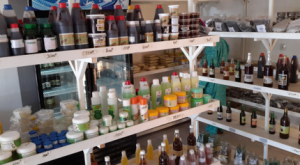Trees: key to life in the Sahel
Last month ITF Vice Chair Prof Roger Leakey argued that ‘We cannot save Forests without Agroforestry’. The importance and potential of agroforestry were very clear when I recently visited Burkina Faso.
Pierre Dembélé and Drissa Gana from ITF’s partner Sahel Eco joined me and ITF Treasurer Maria Grecna to visit our new African Drylands projects in Burkina Faso. The Sahel Eco team have vast experience to share. They are achieving great results in Mali by helping communities restore degraded land, regenerate native trees and conserve remaining woodlands.
With their support, women are earning better incomes by making and selling juices, soaps and cosmetics from fruits harvested from native trees. These products are well known locally and are increasingly attracting international interest.
Non-timber forest products
Adama Ouedraogo, president of community organisation Sauvons le Reste, helps families in northern Burkina Faso affected by mental health issues. With support from ITF, Sauvons le Reste will help them establish agroforestry plots including Moringa and Baobab trees to produce highly nutritious leaves and fruits.
Patrice Bamoni of the Association pour la Préservation du Capital Productif introduced us to communities in Kisio and Perkouan villages in western Burkina Faso. Their project will help these villages manage their land more sustainably, increase tree cover by 14,500, and make better use of tree products.
Burkina Faso has vast areas of dryland savanna with scattered trees including the valuable Baobab, Tamarind, Desert date, and Shea tree (whose nuts produce the famous shea butter).
Farmers grow sorghum and millet and tend livestock, but the tree cover is the essential element that sustains the entire system. People are facing serious challenges due to climate change and gradual loss of trees and soils: lack of fodder for their animals, lack of rain and lack of drinking water.
The situation at Perkouan is especially challenging: since 5,000 people were re-settled to make way for an Australian-owned zinc mine. Burkina Faso is ‘blessed’ by rich mineral resources including gold, zinc and uranium – but is one of the poorest countries in the world: 183rd (out of 188) in UNDP’s Human Development Index.
It is hard to escape the impression that Burkina’s true resources are not so much its minerals as its hard-working people, its vast cultivable lands, its valuable native trees, and their long history of working together in savanna agroforests.
By Paul Laird, ITF Programmes Manager
Donate Today
Support communities on the front lines of the climate crisis to plant trees, restore ecosystems and improve their livelihoods.




